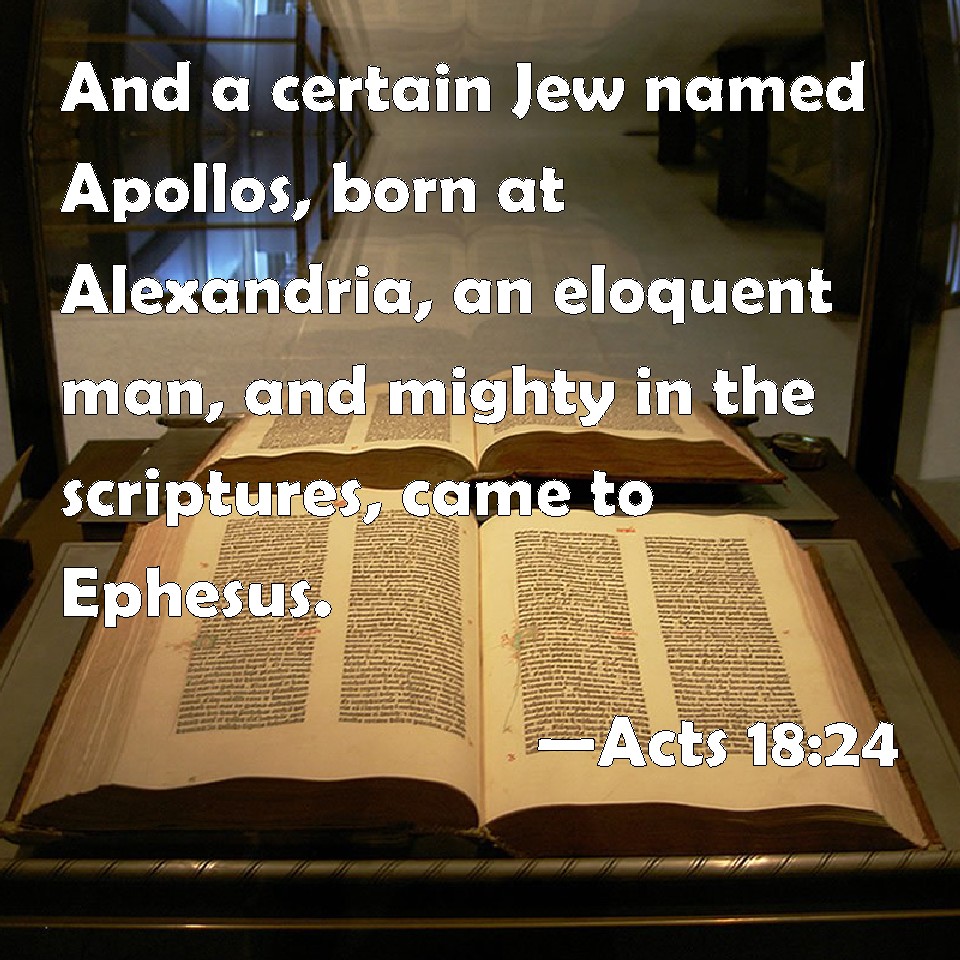|
Verse (Click for Chapter)
New International Version
Meanwhile a Jew named Apollos, a native of Alexandria, came to Ephesus. He was a learned man, with a thorough knowledge of the Scriptures. New Living Translation Meanwhile, a Jew named Apollos, an eloquent speaker who knew the Scriptures well, had arrived in Ephesus from Alexandria in Egypt. English Standard Version Now a Jew named Apollos, a native of Alexandria, came to Ephesus. He was an eloquent man, competent in the Scriptures. Berean Standard Bible Meanwhile a Jew named Apollos, a native of Alexandria, came to Ephesus. He was an eloquent man, well versed in the Scriptures. Berean Literal Bible Now a certain Jew named Apollos, a native of Alexandria, came to Ephesus, being an eloquent man, mighty in the Scriptures. King James Bible And a certain Jew named Apollos, born at Alexandria, an eloquent man, and mighty in the scriptures, came to Ephesus. New King James Version Now a certain Jew named Apollos, born at Alexandria, an eloquent man and mighty in the Scriptures, came to Ephesus. New American Standard Bible Now a Jew named Apollos, an Alexandrian by birth, an eloquent man, came to Ephesus; and he was proficient in the Scriptures. NASB 1995 Now a Jew named Apollos, an Alexandrian by birth, an eloquent man, came to Ephesus; and he was mighty in the Scriptures. NASB 1977 Now a certain Jew named Apollos, an Alexandrian by birth, an eloquent man, came to Ephesus; and he was mighty in the Scriptures. Legacy Standard Bible Now a Jew named Apollos, an Alexandrian by birth, an eloquent man, arrived at Ephesus; and he was mighty in the Scriptures. Amplified Bible Now a Jew named Apollos, a native of Alexandria, came to Ephesus. He was an eloquent and cultured man, and well versed in the [Hebrew] Scriptures. Christian Standard Bible Now a Jew named Apollos, a native Alexandrian, an eloquent man who was competent in the use of the Scriptures, arrived in Ephesus. Holman Christian Standard Bible A Jew named Apollos, a native Alexandrian, an eloquent man who was powerful in the use of the Scriptures, arrived in Ephesus. American Standard Version Now a certain Jew named Apollos, an Alexandrian by race, an eloquent man, came to Ephesus; and he was mighty in the scriptures. Contemporary English Version A Jewish man named Apollos came to Ephesus. Apollos had been born in the city of Alexandria. He was a very good speaker and knew a lot about the Scriptures. English Revised Version Now a certain Jew named Apollos, an Alexandrian by race, a learned man, came to Ephesus; and he was mighty in the scriptures. GOD'S WORD® Translation A Jew named Apollos, who had been born in Alexandria, arrived in the city of Ephesus. He was an eloquent speaker and knew how to use the Scriptures in a powerful way. Good News Translation At that time a Jew named Apollos, who had been born in Alexandria, came to Ephesus. He was an eloquent speaker and had a thorough knowledge of the Scriptures. International Standard Version Meanwhile, a Jew named Apollos arrived in Ephesus. He was a native of Alexandria, an eloquent man, and well versed in the Scriptures. Majority Standard Bible Meanwhile a Jew named Apollos, a native of Alexandria, came to Ephesus. He was an eloquent man, well versed in the Scriptures. NET Bible Now a Jew named Apollos, a native of Alexandria, arrived in Ephesus. He was an eloquent speaker, well-versed in the scriptures. New Heart English Bible Now a certain Jew named Apollos, an Alexandrian by race, an eloquent man, came to Ephesus. He was mighty in the Scriptures. Webster's Bible Translation And a certain Jew named Apollos, born at Alexandria, an eloquent man, and mighty in the scriptures, came to Ephesus. Weymouth New Testament Meanwhile a Jew named Apollos came to Ephesus. He was a native of Alexandria, a man of great learning and well versed in the Scriptures. World English Bible Now a certain Jew named Apollos, an Alexandrian by race, an eloquent man, came to Ephesus. He was mighty in the Scriptures. Literal Translations
Literal Standard VersionAnd a certain Jew, Apollos by name, an Alexandrian by birth, a man of eloquence, being mighty in the Writings, came to Ephesus; Berean Literal Bible Now a certain Jew named Apollos, a native of Alexandria, came to Ephesus, being an eloquent man, mighty in the Scriptures. Young's Literal Translation And a certain Jew, Apollos by name, an Alexandrian by birth, a man of eloquence, being mighty in the Writings, came to Ephesus, Smith's Literal Translation And a certain Jew, Apollos by name, an Alexandrian by birth, an eloquent man, arrived at Ephesus, being able in the writings. Catholic Translations
Douay-Rheims BibleNow a certain Jew, named Apollo, born at Alexandria, an eloquent man, came to Ephesus, one mighty in the scriptures. Catholic Public Domain Version Now a certain Jew named Apollo, born at Alexandria, an eloquent man who was powerful with the Scriptures, arrived at Ephesus. New American Bible A Jew named Apollos, a native of Alexandria, an eloquent speaker, arrived in Ephesus. He was an authority on the scriptures. New Revised Standard Version Now there came to Ephesus a Jew named Apollos, a native of Alexandria. He was an eloquent man, well-versed in the scriptures. Translations from Aramaic
Lamsa BibleAnd a certain Jew named A-pol’los, a native of Al-ex-an’dri-a, an eloquent man and well versed in the scriptures, came to Eph'esus. Aramaic Bible in Plain English One man, a Jew whose name was Apollo, a native of Alexandria and instructed in the word, was familiar with the Scriptures and he came to Ephesaus. NT Translations
Anderson New TestamentAnd a certain Jew, named Apollos, an Alexandrian by birth, an eloquent man, and mighty in the Scriptures, came to Ephesus. Godbey New Testament And a certain Jew, Apollos by name, an Alexandrian by race, an eloquent man, came into Ephesus, being mighty in the scriptures. Haweis New Testament Now a certain Jew named Apollos, an Alexandrian by birth, a man of eloquence, who was powerful in the Scriptures, had come to Ephesus. Mace New Testament In the mean time a Jew, nam'd Apollos, born at Alexandria, a man of letters, and vers'd in the scriptures, arriv'd at Ephesus. Weymouth New Testament Meanwhile a Jew named Apollos came to Ephesus. He was a native of Alexandria, a man of great learning and well versed in the Scriptures. Worrell New Testament Now a certain Jew, Apollos by name, an Alexandrian by birth, a learned man, came down to Ephesus; and he was mighty in the Scriptures. Worsley New Testament Now there came to Ephesus a certain Jew named Apollos, an Alexandrian by birth, an eloquent man, and mighty in the scriptures. |

Correio eletrónico: |
Palavra-passe: |
|





